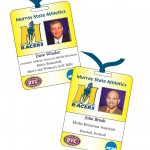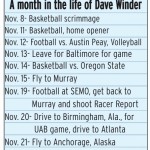Sophie McDonald
Sports Editor
Behind the scenes work is tough.

Athletes and coaches appear at press conferences, team media guides are created, the scoreboard lights up correctly and stats are recorded. These tasks don’t magically happen but are thoughtfully prepared and accomplished through sports information directors. Murray State has four SIDs who run the internal duties for all Murray State athletics and these are two of their stories.
Dave Winder, assistant athletic director – media relations, men’s basketball, men’s and women’s golf, rifle
Dave Winder may have begun working at Murray State in 2001, but his relationship with the University originated in 1983 as a sophomore baseball player.
During his baseball career as a Racer, Winder was an All-OVC first baseman in 1987 and set an OVC single-game record of 12 RBIs in 1986, a record he holds to this day.
After graduating in 1987 with a degree in journalism with television and radio emphasis, the Jack son, Mo., native became the voice of the Southeast Missouri State Redhawks while working with Zimmer Broadcasting, a company he worked for since high school. In 1991, Winder became a sports anchor for WPSD in Paducah, Ky., during which time he did the Racer Report, with the football and basketball coaches.
In 2001, Winder launched into his professional career at Murray State with athletics fundraising, marketing and promotions while still doing TV on the side. After four years he made the switch to sports information and is now the director of the department.

“I break our office up into three parts, one part is the coverage, the writing, the pictures and the website stuff we do on a daily basis depending on who’s playing,” he said. “Of course keeping up with the website is a big part of what we do. Staffing all home events is another big part of what we do, I think we have more than 100 home events each year, a lot of times we’re running the scoreboard, and sometimes we’re doing PA.”
Additionally, SID’s travel with their teams and survey as a buffer between the media and the athletic department, as well as producing media guides for each sport.
“My busy time is men’s basketball; of course we all have a busy fall and you use the time when you’re not doing a lot of games to get ready for the next season which means putting the media guide together,” Winder said. “I finished the men’s basketball guide this week and I’ll be starting right in on the golf guides pretty soon because I want to get those out right after the first of the year.”
The media guides don’t happen overnight, he said.
“In the men’s guide I have around 250-300 hours total, that’s not all done at once, a lot of it I did when the season was over,” he said. “I started going through the records and updating that stuff and I wrote returning player bios last spring when the season was over. There is just a lot of stuff in the guide.”
The department has a team atmosphere and, although they are constantly working ahead, Winder said obligations sometimes stack up.
“The thing I struggle with is I’ve been given the responsibility of being the leader of the department but at the same time I have my sports to take care of too,” he said. “That’s where the administrative part of the job and then doing the various sports I have to do sometimes piles up on me a little bit. Plus, since I have the radio/TV background I’ll help Neal Bradley when he needs it, and we started the Racer TV Network and we’re doing six football games, so I’m doing commentary on those and we’ll do 9 to 10 basketball games and I do the Racer Report every week, so I just try to juggle it all. It’s an ambitious schedule.”
Despite the sometimes hectic timetable, Winder said he really enjoys his job.
“I still like gameday; I look forward to when our teams play and how this chapter going to end up today,” he said. “I thought about coaching at one point, but went into the media part of it, so it’s fun for me being around the coaches and getting to know them, and I was a student-athlete at one time so it’s good being around them.”
Motivated by the privilege of representing the University, Winder is a Racer to the core.
“For me it’s the Murray State thing – I love the place and would do anything for it,” he said. “There hasn’t been a day since I’ve been back that I don’t look forward to going to the Stadium in the morning. I love athletics and I love Murray State athletics.”
John Brush, media relations assistant, football, baseball
As a college freshman, John Brush entered the sports information world.
Brush, a communications major with emphasis on sports broadcasting from Waynesburg College in Waynesburg, Pa., started out doing hands-on work out of the school’s broadcast truck.
“We were a school of about 1,000 students but we had our own truck and were contracted out to do a high school football game every Friday night,” he said. “By the end of my freshman year I was in the truck running replays.”
During his first semester of sophomore year, his academic advisor, who was also the baseball coach and SID proposed a question that set the course of Brush’s future career.
“I had him in a sports writing class so he got me more on that side and asked if I wanted to help him out with home basketball games doing stats,” he said. “I did starting that semester and from then on he helped me get more involved with sports information and I decided this is where I wanted to be.”
Two months after graduating, Brush began a sports information internship at Angelo State in San Angelo, Texas, before coming to Murray in 2007.
Driven by the goal of representing the athletes with excellence, Brush said despite his workload, the athletes have the harder job.
“I’ve got the easy part; the players have the hard part – they have to go perform and when they do something right I get to write about it – that’s the fun part,” he said. “It’s really all about them – my job is to make everyone know about them. I like the fact that no one knows who I am. I never want to be the center of attention. I want that attention to be directed toward the athletes and coaches and the programs here.”
Depending on the season and sport, Brush said the hardest part of being an SID is time management.
“You never know what’s going to happen and the next day is never the same as the day before which is a good thing, but at the same time you’ve got to learn to manage your time and not get too caught up in specific things,” he said. “You’ve got to be able to multi-task and do certain things beyond what is going on at that time.”
The best part of the job is the travel and the view, he said.
“I get paid to watch college football every day in the fall and when spring rolls around I get to travel around and watch college baseball,” he said. “To me, college football and college baseball are a million times better than professional in my mind. I don’t know what it is, but I know it’s my preference. To get to travel around all fall and spring to watch football and baseball – it doesn’t get much better than that.”
In a job primarily composed of writing, Brush said growing up he had no intentions of doing anything with the written word.
“In junior high and high school I always said I would never do a job where I had to write and now that’s all I do, so somewhere in there something went wrong or maybe something went right,” he said.
Brush has no plans of doing anything but sports information for the rest of his life, he said.
“I want to stay in this profession; I always joke around that I’ll never be able to retire and that I’ll be climbing on that bus when I’m 90,” he said. “I love doing this, I can’t see myself doing anything else and I don’t think I’d want to do anything else.”
Advice from John for aspiring sports information people:
“Take care of your coaches. Build a relationship with them and build trust so they know they can trust you and you can trust them.
“One thing in this profession, you have to leave your ego at the door. You are a lot of times the fall guy for certain things when it comes to coaches and one thing is for sure, every coach is different.
“I’ve dealt with a lot of different coaches, and when it come to post game they will take their frustration out on you, not directed at you but it’s going to come toward you and you have to check your ego. Have a thick skin and let them vent. A lot of times you really want to say something back and you don’t, let them get it off their chest and continue on to post-game, and nine times out of 10 they will come back and apologize to you.
“It’s just one of those things, everybody knows in the heat of competition how you can get, and right after they talk to the team in the locker room you’re the first person they see. After a tough loss, the last thing a coach wants to do is go talk to a newspaper reporter or TV and answer questions for them, so they’re going to vent to you and by the time their interviews happen they are calm and won’t say anything they shouldn’t say.
“That said, I don’t want people coming into this profession that every coach is like that, there are a lot of coaches that are not like that, but there are some you’re going to be like that. I know that Coach Hatcher, win or lose, he’s always the same – you know what you’re going to get out of him, and you feel more comfortable going up to him after the game.
“Building that relationship is so important. It’s more than on game day or at practice, it’s getting to know the coaches and letting them get to know you and the more you build that relationship and the trust you build between the two of you will help you. If a coach doesn’t trust you then he’s not going to give you the information you need but if he trusts you he’ll let you around more which allows you to do your job better and helps you advance the program and makes for a whole better atmosphere.”